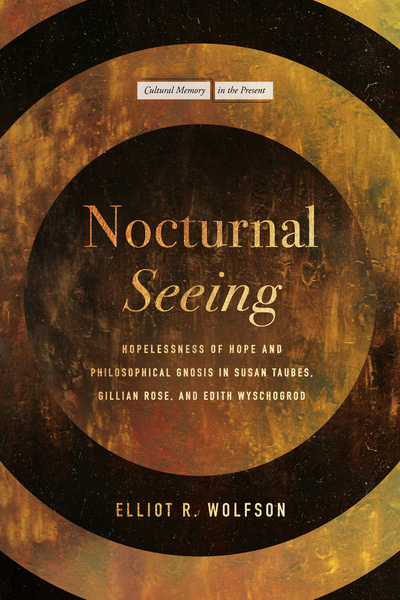
October 2024
392 pages.
from $35.00
Hardcover ISBN: 9781503640665
Paperback ISBN: 9781503640962
In this erudite new work, Elliot R. Wolfson explores philosophical gnosis in the writings of Susan Taubes, Gillian Rose, and Edith Wyschogrod. The juxtaposition of these three extraordinary, albeit relatively neglected, philosophers provides a prism through which Wolfson scrutinizes the interplay of ethics, politics, and theology. The bond that ties together the diverse and multifaceted worldviews promulgated by Taubes, Rose, and Wyschogrod is the mutual recognition of the need to enunciate a response to the calamities of the twentieth century based on an incontrovertible acknowledgment of the decadence and malevolence of human beings, without, however, succumbing to acrimony and despair. The speculation of each of these philosophers on melancholia and the tragicomedy of being is unquestionably intricate, exhibiting subtle variations and idiosyncrasies, but we can nevertheless identify a common denominator in their attempt to find the midpoint positioned between hope and hopelessness. As Wolfson articulates, Taubes, Rose, and Wyschogrod exemplify a philosophical sensibility informed by a nocturnal seeing, which is not merely a seeing in the night but rather a seeing of the night. Ultimately, the book reveals the potential for these thinkers' ideas to enhance our moral sensitivity and to encourage participation in the ongoing struggle for meaning and decency in the present.
About the author
Elliot R. Wolfson is Marsha and Jay Glazer Endowed Chair in Jewish Studies and Professor of Religion Emeritus at the University of California, Santa Barbara. His most recent book is The Philosophical Pathos of Susan Taubes: Between Nihilism and Hope (Stanford, 2023).
"In this rigorous yet poetic study, Wolfson engages dialogues with three remarkable Jewish philosophers: Susan Taubes responding to Heidegger, Gillian Rose criticizing post-modernism, Edith Wyschogrod exploring postmodern transcendence. Wolfson then weaves intellectual debts, heritages, and prospects—showing that we don't have to entrench ourselves 'on two sides of a line that nobody drew.'"
—Bettina Bergo, University of Montreal
"With his characteristic breadth and depth of learning, Wolfson introduces us to three subtle, original thinkers. He makes a convincing case that these Jewish women deserve to be understood as philosophers in the most profound sense of the term."
—Vincent Lloyd, Villanova University